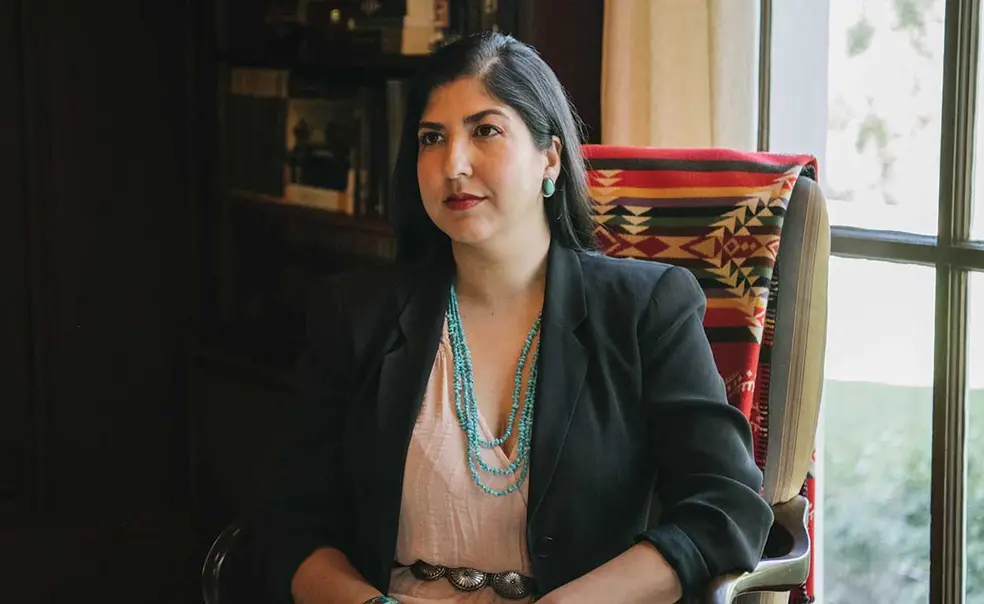Jacqueline De León ’05 Fights for Native American Rights
This attorney has dedicated her career to address injustices
For years, people told Jacqueline De León ’05 that she should be a lawyer. “I’m logical and argumentative,” jokes the former philosophy major. Beyond that, she says she’s “very justice-oriented,” especially about Native American rights. This was born in part from a childhood spent making regular visits from her home in Simi Valley, California, to Isleta Pueblo, the reservation in New Mexico where her mother was born and many of her relatives live. “Seeing how talented and smart and beautiful the people and our culture are contrasted with a lot of structural issues that make it difficult to thrive — that injustice really weighed on me,” she says.
Today, De León is helping to address those injustices head-on as a Colorado-based staff attorney at the Native American Rights Fund (NARF). On behalf of NARF, she advocates for voting bills and the Native American Voting Rights Act on Capitol Hill, seeks to shape policy by testifying before Congress and state legislatures and commenting on state legislative drafts, and sues states and counties that discriminate against Native Americans. In 2020, she co-authored a report called “Obstacles at Every Turn: Barriers to Political Participation Faced by Native American Voters,” based on a series of field hearings she helped lead to find out why Native Americans vote at disproportionately low rates. Only 66 percent of eligible Native Americans are registered to vote, meaning that more than 1 million such citizens remain unregistered.
“Most Americans would be shocked by the conditions that Native Americans are forced to go through in order to participate in democracy,” says De León. For example, some people have to drive 100 miles roundtrip, off and on dirt roads, to register or vote, and many homes do not have addresses, which makes it difficult to register or vote by mail — or to receive any mail at all. In 2020, De León was part of a team that successfully sued North Dakota over 2012 and 2017 voter-ID laws that required IDs to have a residential address on them, effectively cutting off the many Native Americans whose homes do not have addresses from “being able to vote even though they were qualified American citizens.”
Beyond such structural barriers, historical and present-day racial hostilities, especially in the towns bordering Native reservations that are usually tasked with providing polling locations and other services, have led to “a real reluctance to provide equitable voting services on reservations,” De León says. She learned that in one South Dakota county, officials had created a polling location for Native Americans from a chicken coop, which would-be voters found humiliating. In Utah, a county clerk falsified a report to remove a Native American candidate from the ballot.
“Having that education of hearing directly from people about why it’s so difficult to vote really rooted me in these issues and has led me to be a better advocate,” she says.
De León’s journey to her “dream job,” as she calls it, came with some surprising twists. As a first-generation college student, she had no one in her family who could help navigate post-college life. While classmates graduated with jobs already lined up, “I just sort of graduated and went home,” she says.
Back in California, she applied her logical, philosophy-major brain to the task of figuring out what was important to her. She concluded that she wanted to travel yet also spend time at home to remain close to her younger siblings. She secured a job as a flight attendant for Alaska Airlines.
De León enjoyed the job — “I fell in love with Alaska, and got to read books the whole time I was flying” — but became restless after a year, knowing she had “skills that I wasn’t using to better the injustices that I knew existed.” So, she went to Washington and worked for the National Congress of American Indians Policy Research Center (and also met her husband, Marco De León *13). De León earned her J.D. from Stanford and worked as a law clerk in both Alaska and Newark, New Jersey. She then spent four years at an international law firm, focusing on antitrust and litigation, before joining NARF.
De León’s Cuban-immigrant father taught her from a young age that America is the land of opportunity. Squaring that notion with the country’s unequal treatment of Native Americans has been a source of internal struggle. “This democracy project and thinking about increasing Native American voting rights is in a lot of ways a reconciliation of that conflict,” she says.










No responses yet